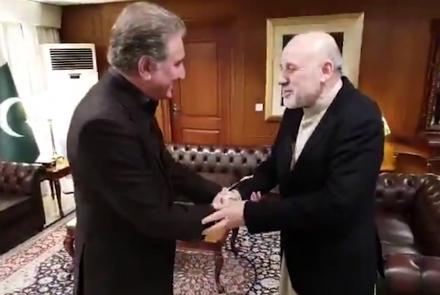The High Peace Council (HPC) on Saturday said Pakistani officials in their meetings with Umer Daudzai, President Ashraf Ghani’s Special Representative on Regional Affairs for Consensus on Peace, have agreed to hold a meeting of Afghanistan-Pakistan religious scholars in the near future.
Daudzai returned home from a four-day visit to Islamabad on Friday. He met with Pakistani officials as well as religious and political leaders in Pakistan to discuss the Afghan peace process.
The HPC spokesman Sayed Ehsan Taheri said Pakistan has committed to help Afghanistan in building a regional consensus on the peace process and bringing the Taliban to negotiations table.
“We are cautiously optimistic because we are waiting to see the first step by Pakistan after this visit. Fortunately, their efforts have increased and they have a united voice in this regard,” said Taheri.
Analysts said there is a need for regional consensus on Afghan peace.
“Regional consensus is a need. Countries such as China, Pakistan, India, Iran and Russia can create a regional consensus,” said Shaida Mohammad Abdali, former ambassador of Afghanistan to India.
The National Unity Government has accelerated its efforts on building a regional consensus on the peace talks. In addition to Daudzai’s visit to Pakistan, President Ashraf Ghani’s National Security Advisor Hamdullah Mohib has started a regional tour to discuss the regional countries cooperation in the peace process among other issues around bilateral relations.
Mohib held talks with China’s Foreign Minister and his Chinese counterpart Guo Shengkun on Thursday and Friday where they discussed issues around the Afghan peace process and future regional cooperation on security and counter-terrorism efforts.
“As the terrorists have regional roots and dimensions, thus cooperation of our international partners, including the regional countries, can becrucial in the peace process,” said Omid Maisam, deputy spokesman for Chief Executive Abdullah Abdullah.
While Kabul is expecting the neighboring countries and other international allies to convince the Taliban to start face-to-face talks with Afghan government, some lawmakers criticized involvement of a number of countries in this process.
“We are concerned that the countries talking to the Taliban, instead of having done anything for resolving Afghanistan crisis, have established public relations with Taliban by making support to the peace process as an excuse,” MP Saleh Mohammad Saljoqi said.
This comes as the United States Special Representative for Afghanistan Reconciliation Ambassador Zalmay Khalilzad has started his third regional tour on Afghan peace starting from January 8 - 21. The US Department of State has sid that Khalilzad will visit India, China, Afghanistan, and Pakistan during this trip.

